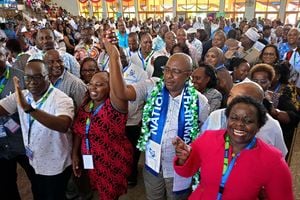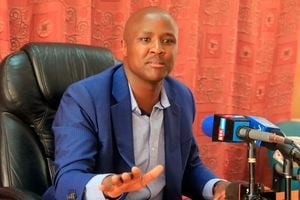Happening now: One-on-one with President William Ruto
Passports mix-up in panic to expel Arturs

Artur Margaryan
The Armenian Artur brothers were mistakenly given return air tickets in the panic to get them kicked out of Kenya, it was revealed yesterday.

The tickets were about to be handed over with take-off just 30 minutes away, when the error was spotted and the return part of the tickets was ripped out, the inquiry into the brothers' activities was told.
And as a whirlwind of activity went on around them to ensure they got on the plane in time, Artur Margaryan was allowed to travel on someone else's passport – that of a Russian called Gevorkiyan – while his supposed brother Sargsyan who had no passport was given emergency travel papers.
Bizarrely, instead of saying he was being expelled, the document merely stated he was going to Dubai on business which meant Mr Sargsyan could legally claim he was never deported. And it was wrongly dated, too: July 9 instead of June 9, the inquiry was told.
Because the paper, known as a Certificate of Emergency Travel, said Mr Sargsyan was travelling on business and there are still 10 days to go until July 9, he could in theory use it to return to Kenya, the inquiry heard.
And in a day of dramatic disclosures, it was also claimed that the brothers were cleared to work in Kenya by both the Immigration Department and the National Security Intelligence Service, which vetted their work permit applications.
The series of revelations rocked the second day of the inquiry into the two Armenians, described the previous day by Immigration minister Gideon Konchella as "dubious international criminals."
Mr Sargsyan's emergency travel papers showed he was either Armenian or Russian, the inquiry at Kenyatta International Conference Centre was told by its second witness, principal immigration officer Joseph Ndathi.
Asked why the certificate did not read 'deportation', Mr Ndathi replied, "it is a question of language semantics." He explained: "He was going to Dubai where he had come from to continue with his business."
Asked by assisting counsel Warui Mungai if Mr Sargsyan could claim he was not deported, Mr Ndathi said, "he will be within his rights to do so."
He said it was the deportation orders and the systems put in place to prevent the Artur brothers from re-entering Kenya that mattered most.
Mr Mungai told Mr Ndathi investigations also showed the Artur brothers were given return air tickets. Mr Ndathi replied that the four Kenya Airways tickets – including two for two other people deported with the brothers – were delivered by lawyer Kamau Mbugua and two other unidentified people.
"My lords, they were return tickets but the officers scrutinised and the return coupons were removed. They left with a one-way ticket," the immigration officer said.
The tickets were bought using taxpayers money, in spite of the law allowing the Government to ask wealthy people to pay for their own travel.
On the deportation date the lawyer, Mr Mbugua also handed Mr Ndathi a passport in the name of Mr Arthur Gevorkiyan for use by Mr Artur Margaryan, the taller and bearded brother. It was this passport, showing Mr Gevorkiyan as a Russian, that Mr Margaryan used to travel to Dubai.
Mr Ndathi had a hard time explaining to the commission why Mr Margaryan was allowed to travel using a passport that was not in his own name. He said that there were only 30 minutes to the flight and that Kenya Airways had agreed to the arrangement.
"The security of the State should be seen as of greater concern than a travel document. The passport was also accepted in Dubai," Mr Ndathi said.
A photograph in a copy of Mr Margaryan's passport tabled before the Commission was different from that in Mr Gevorkiyan's passport.
He said the certificate of emergency travel were recognised internationally as one-way travel documents and anyone found re-using one could be fined.
Mr Mungai: Must the deportee have a passport?
Mr Ndathi: It is one of the documents one must have. If not, we issue an emergency travel certificate.
Mr Ndathi said the true nationalities of the Artur brothers were unknown and that his department had relied on information given to them to conclude they were Armenians. "They have given conflicting documents and we need to research these people further," he said.
He said the Arturs had never applied for Kenyan citizenship and that Kenyan passports recovered from their Runda home were stolen from the Immigration department in May. Another passport stolen on May 2, was still missing. He said Kenyan passports could only be granted to foreigners with entry permits who had been in the country for at least five years. Records show the Arturs first came to Kenya last year.
A passport in the name of Artak Sargsyan recovered from the Runda residence showed the holder was a Kenyan. And although the name was slightly different from another passport found there, which identified him as Artur and not Artak, the photographs in the two passports were the same. Immigration records showed the stolen passports belonged to Selasio Njeru Mutumuka and Edith Kahaya Asegere.
Assisting counsel Dorcas Oduor said signatures in the recovered passports had been taken for forensic examination. Mr Ndathi said Kenyan passports were susceptible to having the photographs switched.
He blamed problems facing the Immigration department to under funding, staff shortage and poor technological advancement. He said the department received little support from the Treasury and relied on part of its revenue collection, whose total was Sh1.8 billion last year, for development, operations, and staff pay and allowances.
Its efforts to upgrade its information communication technology were hampered by the Anglo Leasing scandal, Mr Ndathi said.
It also came to light that the country's Intelligence and Immigrations officials fell for suspect official documents presented by the Armenian brothers.
The commission was told the brothers were cleared by both the National Security Intelligence Service and the Immigration Department to conduct business in Kenya. The clearance was given following a request made by the Immigration department in keeping with their tradition of having every request for an entry permit checked before foreigners were allowed into the country.
The Armenians were finally issued with two-year permits on January 23 this year. They were cancelled after the two were deported.




